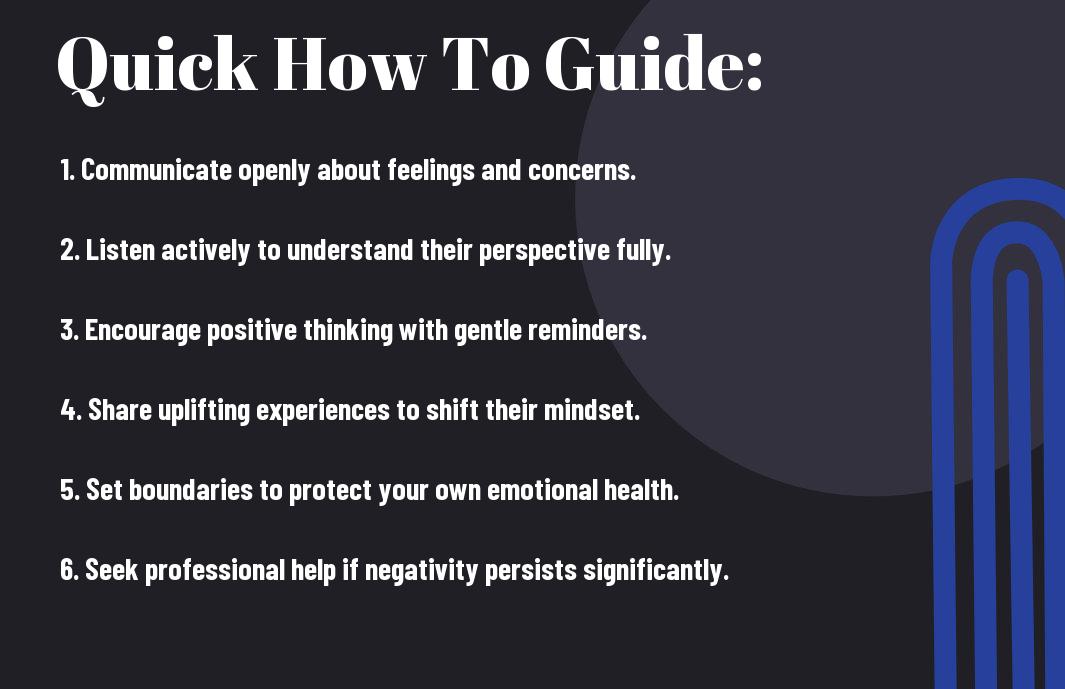Over time, dating someone with a pessimistic outlook can strain your relationship, leaving you feeling drained or frustrated. Understanding how to navigate this dynamic is necessary for fostering a healthier partnership. In this guide, you will learn practical strategies to support your partner while also protecting your own emotional well-being. By utilizing effective communication and fostering a more positive environment, you can create a balanced relationship that works for both of you.

Understanding Pessimism
While dating someone with a pessimistic outlook can be challenging, it’s important to understand the nature of pessimism itself. Pessimism often involves a tendency to see the negative side of situations, leading to a focus on potential failures rather than successes. This mindset can stem from past experiences, personal beliefs, or even environmental influences, making it important to grasp the underlying factors that contribute to such an outlook.
What is Pessimism?
Even though pessimism is often viewed negatively, it is a cognitive style that emphasizes the potential for unfavorable outcomes. This perspective may cause your partner to dwell on the downsides instead of focusing on positive possibilities, creating an overall feeling of helplessness or hopelessness.
Factors Contributing to Pessimistic Outlooks
There’s a variety of factors that may contribute to a person’s pessimistic worldview. These elements may include:
- Past trauma or negative experiences
- Low self-esteem or self-worth
- Your environment or social circle
- Cognitive biases that highlight negativity
This combination of influences can significantly shape how someone perceives the world around them, making it vital to approach your partner’s pessimism with empathy and understanding.
Pessimistic attitudes can also be reinforced by certain cognitive patterns that lead to a cycle of negativity. For example:
- Overgeneralization of negative events
- Discounting the positive aspects of life
- Focusing solely on problems rather than solutions
This recurring thought process can create barriers to cultivating a more balanced and hopeful perspective in your partner. Acknowledging these factors will help you navigate your relationship more effectively.

How to Approach a Pessimist
It’s important to approach a pessimist with understanding and patience. Their worldview might be shaped by past experiences or struggles, and simply dismissing their concerns can lead to misunderstandings. Instead, take the time to listen and validate their feelings without jumping to solutions. By showing empathy, you can create a safe space for open dialogue, making it easier for you both to navigate challenging conversations.
Communication Techniques
Some effective communication techniques include asking open-ended questions and practicing active listening. Instead of focusing on the negative, encourage discussions about potential solutions or silver linings. This can help shift their perspective gradually. When discussing sensitive topics, make sure to approach them calmly and avoid confrontation to foster a positive environment.
Building Trust and Openness
For building trust and openness, creating a genuine connection is vital. Share your own experiences and vulnerabilities to foster a reciprocal exchange. This mutual sharing can help break down barriers and encourage your partner to feel more secure in opening up. It’s about establishing a foundation where both of you can express yourselves freely.
With consistent communication and a willingness to understand their viewpoint, you can cultivate a deeper level of trust. This will not only improve your relationship dynamic but also allow both of you to confront challenges together. Building this sense of safety encourages your partner to share their thoughts without fear of judgment, making them more receptive to discussing positive changes over time.
Tips for Maintaining Positivity in the Relationship
Despite the challenges that come with dating a pessimist, you can foster a positive atmosphere in your relationship. Here are some tips to help maintain that positivity:
- Practice gratitude together.
- Set positive goals as a couple.
- Engage in uplifting activities.
- Communicate openly about feelings.
- Encourage a supportive environment.
After implementing these strategies, you will likely notice a shift in your relationship dynamics.
Encouraging Positive Thinking
To help your partner embrace a more positive outlook, actively encourage them to focus on their strengths and accomplishments. Celebrate their achievements, no matter how small, and engage in conversations that highlight the good in different situations. By consistently redirecting their thoughts toward positivity, you can help nurture a healthier mindset over time.
Setting Healthy Boundaries
For your relationship to thrive, it’s imperative to set healthy boundaries regarding negativity. Clearly communicate your limits on how much negativity you are willing to absorb. Make sure to express that while you are supportive, you also need personal space to maintain your own mental well-being.
It is important to establish boundaries so both you and your partner can navigate negativity without feeling overwhelmed. Talk about what is acceptable when discussing challenges and what might be too much for you. By having these conversations, you are protecting your mental health while providing a safe space for your partner to express their thoughts and feelings. This balance allows both of you to work on your perspectives without compromising your emotional well-being.
Recognizing When to Seek Help
Unlike optimistic individuals, those who lean towards pessimism may struggle with their outlook on life, which can deeply affect relationships. As you navigate your connection with a pessimist, it’s crucial to recognize when the emotional strain becomes too heavy for both of you to manage alone. Seeking support can provide the tools needed to improve communication and promote healthier dynamics.
When to Consider Professional Guidance
On occasions when discussions turn into arguments, or you notice a consistent wave of negativity influencing your mood, it may be helpful to consider professional guidance. Engaging with a therapist or counselor can provide both of you with strategies to address underlying issues and foster a more positive relationship.
Signs of Unsustainable Dynamics
For you, some red flags indicating unsustainable dynamics may include chronic feelings of frustration, avoidance of difficult conversations, and a general sense of helplessness in the relationship. If the pessimism of your partner starts to overshadow moments of joy or leaves you feeling drained, it’s important to reassess the situation.
Consider how persistent negative patterns affect your emotional well-being. If you find yourself constantly supporting your partner without reciprocation or feeling like your needs are consistently sidelined, these dynamics can lead to toxicity. Acknowledging these signs can help you determine if it’s time to seek professional help or reevaluate your relationship’s viability.
The Importance of Self-Care
Now that you’re navigating the complexities of dating someone with a pessimistic outlook, prioritizing self-care becomes crucial. Nurturing your emotional and mental well-being empowers you to maintain a healthy balance in the relationship. Engaging in self-care activities like meditation, exercise, or hobbies you enjoy will not only help you recharge but also support you in managing any negativity that might arise. By taking care of yourself, you’ll enhance your resilience and ability to respond empathetically to your partner’s struggles.
Managing Your Own Emotional Health
Little attention to your emotional health can lead you to feel overwhelmed and drained. Practicing mindfulness techniques, journaling your thoughts, or seeking therapy can provide you with the tools to process your feelings more effectively. By fostering your emotional resilience, you create a stable environment for both yourself and your partner, enabling constructive communication and a more supportive relationship.
Finding Support Outside the Relationship
There’s a lot to gain from reaching out to friends and family for support when you’re dating a pessimist. These people can provide a different perspective, offering you a much-needed break from your partner’s continual negativity. Surrounding yourself with positive influences can help you maintain a hopeful outlook on life and diminish feelings of isolation that may arise from your partner’s disposition. Regular check-ins with loved ones can also reinforce your emotional stability.
Support outside your relationship provides not only companionship but also diversifies your emotional outlets. Engaging with friends or participating in community activities encourages a balanced perspective. By sharing your feelings with trusted folks outside the relationship, you gain validation, practical advice, and encouragement. This external support network can be vital in reminding you that positivity and joy exist beyond the boundaries of your partnership, which ultimately helps you maintain your own emotional equilibrium.
Strategies for Conflict Resolution
Not all conflicts with a pessimistic partner have to escalate into full-blown arguments. To help navigate these situations, consider exploring How to Deal With a Negative Spouse. Focus on active listening and acknowledging their feelings, which can create a more constructive dialogue and lessen tension.
Problem-Solving Approaches
There’s no one-size-fits-all solution in relationships, especially when dealing with a pessimistic partner. Instead, try to identify specific issues together and brainstorm possible solutions. Encourage open dialogue while maintaining respect for each other’s perspectives; this can foster a collaborative environment, minimizing the negative impact of pessimism.
Dealing with Disagreements Productively
Conflict often arises from differing viewpoints, but how you navigate these disagreements can significantly impact your relationship. This means focusing on understanding each other’s perspectives rather than casting blame. Approach disagreements with empathy, adopting a problem-solving mindset instead of a combative stance. This allows you to work together towards a shared goal, making it easier to find common ground and reduce negativity.
Final Words
With these considerations, handling a relationship with someone who has a pessimistic outlook requires patience and understanding. You can encourage open communication about feelings and perspectives, utilizing positive reinforcement to highlight the good in situations. Setting boundaries is vital to protect your emotional well-being while striving for balance in the relationship. Additionally, offering support without minimizing their feelings can foster a more constructive environment. By implementing these strategies, you can cultivate a healthier dynamic that allows both of you to thrive.










